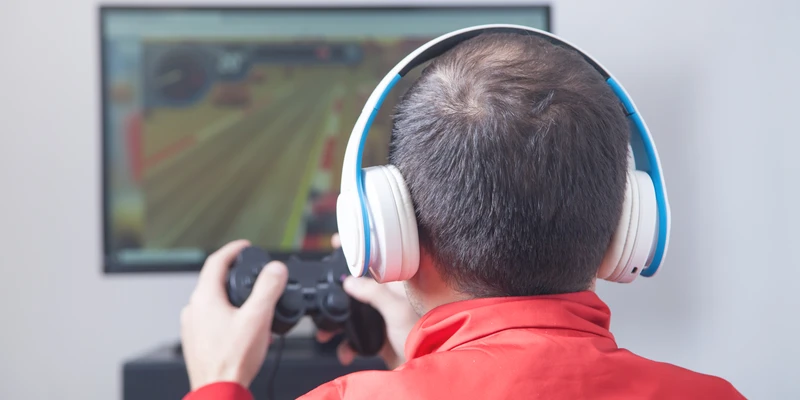Do you feel like video games are starting to take over your life, or are you worried about a loved one who spends too much time gaming but doesn’t recognise the problem? It’s not always easy to realise when gaming shifts from a fun pastime to something harmful, but excessive gaming disorder treatment provides the support and tools needed to gain self-awareness and restore balance in your life.
Understanding Gaming Addiction
Gaming addiction, or gaming disorder, is a recognised behavioural addiction. The World Health Organisation (WHO) classified it in the International Classification of Diseases (ICD-11) under addictive behaviours, alongside gambling addiction. In contrast, the American Psychiatric Association (APA) includes Internet Gaming Disorder (IGD) as a condition for further study in the Diagnostic and Statistical Manual for Mental Disorders (DSM-5).
Like other behavioural addictions, excessively playing video games can affect the brain’s reward system in a way similar to substances like alcohol or drugs. It triggers the release of dopamine, reinforcing the urge to play. Over time, this can lead to cravings, loss of control, and growing dependence. Individuals may continue or even increase their gaming despite clear negative consequences.

Signs and Symptoms of Gaming Addiction
Gaming addiction involves significant distress or impairment, and applies only to gaming, not general internet use, online gambling, or social media. Diagnosis requires at least five symptoms of the following within a year and may involve solo or multiplayer games, as well as offline or online gaming:
- Constantly thinking about gaming.
- Feeling sad, anxious, or irritable when you can’t play.
- Needing to play more and more to feel satisfied.
- Repeated, unsuccessful attempts to cut back or stop gaming.
- Losing interest in hobbies or other activities you used to enjoy.
- Continuing to play even when it causes problems.
- Lying about how much time you spend gaming.
- Gaming to escape negative emotions such as guilt or sadness.
- Risking or losing important things like a job or a relationship due to gaming.
If you notice these symptoms in yourself or a loved one, seek professional help for gaming addiction treatment as soon as possible. It’s important to note that only a qualified healthcare professional can make an accurate diagnosis, ensuring that occasional or enthusiastic video gaming isn’t mistaken for a disorder.
Excessive Gaming Disorder Treatment Options
Treatment for gaming disorder, also known as Internet Gaming Disorder, involves a range of approaches designed to address the various factors that contribute to addiction. These options include:
Individual Therapy
Cognitive Behavioural Therapy (CBT) is one of the most effective treatments for IGD. It helps people understand and change the thoughts and behaviours driving their video game habits, while building healthier routines and coping strategies. A 2025 review of 13 studies confirmed that CBT significantly reduces addiction symptoms, with greater effects from longer and more intensive therapy.
Group Therapy
Persistent gaming is often a way to escape real-life problems for patients with gaming addiction. Group therapy can be meaningful by offering a supportive space where individuals confront reality, share experiences with others, and build the inner strength needed to overcome challenges.
A 2023 study showed that group counselling significantly reduces the severity of gaming disorder. Group-based interventions not only decreased video game time but also improved mental health outcomes, reducing depression, anxiety, and maladaptive thoughts associated with gaming.
Family Therapy
Family therapy is beneficial, especially for young people with gaming addiction, as it helps improve communication, set healthy boundaries, and address triggers within the home environment. Involving families in treatment offers the guidance they need to manage gaming habits more effectively.
A 2021 study found that family therapy sessions significantly reduced problematic gaming in adolescents. The parent-focused, short-term intervention also improved parent–child relationships, suggesting it as a helpful early treatment for video game-related concerns.
Pharmacological Treatment
Medications are not typically the first-line treatment for gaming addiction, but they may be considered in severe cases, especially when co-occurring conditions like anxiety, depression, or attention deficit/hyperactivity disorder (ADHD) are present. A 2023 review of studies has shown that SSRIs and other medications can reduce IGD symptoms, though current evidence is limited and further research is still needed.
Residential Rehab
Residential or inpatient treatment provides intensive, round-the-clock support in a safe and controlled environment, making it ideal for individuals with severe gaming addiction or those experiencing emotional or behavioural withdrawal symptoms. It combines evidence-based therapies tailored to each person’s needs, helping them regain control and focus fully on recovery without potential triggers or distractions.

Strategies to Complement Gaming Addiction Treatment
Excessive gaming disorder treatment extends beyond therapy or rehab alone. It involves practical strategies to help individuals establish healthier habits and maintain long-term recovery. Here are some tips to complement formal treatment:
Create Realistic Goals
Managing gaming addiction begins with structure. Setting clear daily routines and limiting gaming to specific time slots can help prevent it from taking over your day. Tools like calendars, alarms, or time-tracking apps can support this routine and keep you accountable.
Track and Identify Patterns
Monitoring how much time you spend gaming can reveal harmful patterns. Keeping a journal or log helps you reflect on your habits and reinforces positive changes. Daily planning and even small rewards for completing tasks outside of video games can support lasting improvement.
Find Healthy Alternatives
Replacing video games with enjoyable and more fulfilling activities is key to recovery. Engaging in physical activity, pursuing creative hobbies, or spending time with friends can provide healthier outlets. If you enjoy gaming for its social elements, consider team sports, volunteering, or group games.
Build a Strong Support Network
Social connection is vital in overcoming gaming addiction. Make a list of go-to activities and people to turn to when urges hit. Continued recovery often relies on regular check-ins with a therapist, loved ones, or support groups to stay grounded and accountable.
Prepare for Relapse Prevention
A solid relapse prevention plan helps in maintaining long-term progress. Identify early warning signs, such as increasing screen time or isolation, and outline steps to respond. Knowing when and how to reach out for help can also prevent setbacks from turning into full relapses.
Who’s at Risk of Video Game Addiction?
Gaming addiction can affect anyone, but certain patients are more vulnerable. Young people, particularly males, and those who spend extended hours on consoles or computers are more likely to develop problematic gaming habits. People with underlying mental health conditions, such as depression, anxiety or ADHD, also face increased risks.
Social and environmental factors can also contribute to the development of gaming addiction. A lack of close friendships or supportive family relationships may lead individuals to seek comfort online or use gaming as a form of escapism. Game features like rewards, achievements, and in-game spending can reinforce this behaviour, making it even harder to disengage.

The Impact of Addictive Behaviours
Beyond simply losing time, excessive video game use can cause emotional issues like anxiety, depression, irritability, and mood swings, especially when gaming is restricted. These symptoms resemble those seen in other behavioural addictions, often accompanied by a declining interest in non-gaming activities and reduced emotional regulation.
Physically, prolonged video gaming can result in back pain, eye strain, headaches, poor posture, and disrupted sleep. While these issues are not withdrawal symptoms, they may contribute to poor focus, memory problems, and reduced energy levels, further complicating daily functioning and mental health.
Socially, being addicted to gaming can lead to social isolation and withdrawal from friends, family, and meaningful pursuits. Over time, this can harm academic or work performance and lead to a reduced overall quality of life.
Gaming Addiction Help
If you or a loved one is struggling with gaming addiction or is at risk, help is within reach. At Sierra Recovery, we provide specialised rehab programs tailored to gaming addiction and its underlying psychological issues. It may all feel overwhelming for now, but with the right care and guidance, recovery is entirely possible.
Frequently Asked Questions
What are the most effective therapeutic approaches for treating excessive gaming disorder?
CBT is the most commonly used approach, helping individuals change gaming-related thoughts and acts. Other effective methods include individual therapy, group counselling, and structured inpatient and outpatient treatment programmes.
How can cognitive behavioural therapy be applied to manage compulsive gaming habits?
CBT helps identify and change unhelpful thought patterns that lead to compulsive gaming. It teaches time management, coping skills, and alternative activities to replace gaming. Therapists set goals, monitor progress, and support positive change.
What role does family support play in the recovery from excessive gaming disorder?
Family support plays a key role by encouraging, setting healthy boundaries, and participating in therapy. Family involvement helps rebuild trust, improves communication, and reinforces long-term recovery outcomes.
Are there any medications approved for the treatment of gaming addiction?
No medications are specifically approved for gaming addiction, and treatment mainly relies on therapy and support programmes. However, doctors may prescribe medication to treat co-occurring conditions like anxiety or depression.
How long does it typically take for someone to overcome excessive gaming disorder with treatment?
Recovery duration varies per individual. Some improve within months, while others need longer support. Progress depends on the severity of addiction, personal motivation, and support systems.
What strategies can be implemented to prevent relapse into excessive gaming behaviours?
Set gaming limits, develop other interests or hobbies, and join regular therapy and support groups. Learning to manage stress effectively and avoiding known triggers can also help.






